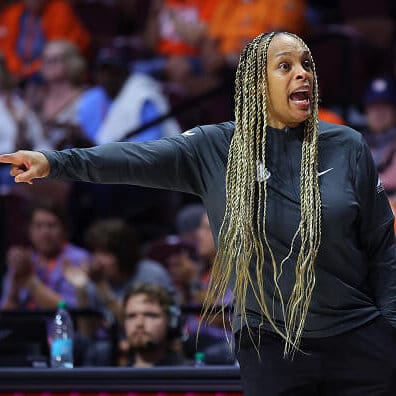The Gist
Angel Reese expressed her feelings of sadness after the dismissal of coach Weatherspoon. In a post shared on the social media platform X, she stated that she was “heartbroken” about the decision. Reese’s message indicates that Weatherspoon was a significant figure in her life, likely playing a vital role in her sports career or personal development.
Weatherspoon’s firing seems to have caused a ripple effect within the sports community, especially among Reese and other athletes who may have looked up to the coach. This indicates that the relationship between players and coaches can deeply impact athletes’ wellbeing and their feelings towards their sport.
The Good
- Emotional Support: Angel Reese’s statement shows the importance of emotional connections in sports. Coaches play a crucial role in an athlete’s development, and this connection can lead to supportive environments.
- Awareness of Mental Health: Reese’s reaction sheds light on the emotional challenges athletes face. Understanding their struggles can promote conversations about mental health in sports.
- Encouragement for Young Athletes: Reese’s heartfelt words might inspire young athletes to appreciate their coaches and their efforts, recognising that such relationships are valuable.
- Unity in the Community: The response from other players to the news may help build a supportive community among athletes, leading to greater friendships and teamwork.
- Inspiration for Change: This incident could lead to a broader conversation about how coaching decisions impact athletes, encouraging teams and organisations to support both players and coaches.
The Bad
- Impact on Morale: Firing a beloved coach can negatively affect players’ morale. Discontent may arise among the team, impacting how they play and work together.
- Uncertainty for Players: Athletes might feel insecure about their future with a new coach. Changes can bring uncertainty, as players adjust to different coaching styles and expectations.
- Negative Reaction: Reese’s statement can prompt fans and other players to voice discontent, creating tension within the team and the broader sports community.
- Potential Loss of Talent: If players feel that their needs are not being met after such changes, they may consider transferring to other teams, resulting in a loss of talent and potential for the team.
- Disruption of Trust: Trust between players and management could be affected. Dismissals like this can lead to doubts about the team’s decision-making, causing unrest.
The Take
Recently, Angel Reese, a young star in the world of sports, took to the social media platform X to express her disappointment over the firing of coach Weatherspoon. Her emotional post highlighted the sadness that comes from such drastic changes in team dynamics. For Reese, the relationship she had with Weatherspoon was extremely important, and losing her means she’s lost a mentor and a guiding figure in her life. This raises awareness of how vital it is for coaches to build strong connections with their players, as these relationships can support and encourage athletes through thick and thin.
The situation is not isolated to Reese. The sports community often feels the impact when such changes happen. Coaches like Weatherspoon influence the energy of a team, pushing them to work harder and strive for success. When a coaching change occurs, especially one that is not welcomed by the players, it can affect team morale. Players, both current and former, may feel compelled to speak out about their feelings, as seen with Reese’s post. These social media platforms allow athletes to share their emotions and connect with fans, giving them voices beyond the playing field.
Moreover, outcomes of such events often ripple outwards. The firing of a coach can cause other players to feel uneasy. Some may question their position on the team or how the future might look. The uncertainty is not just an emotional struggle; it may affect their performance on the court or field, leading to poorer results for the team as a whole. The importance of feeling safe and supported cannot be stressed enough in the athletic arena. A positive experience with a coach can improve not just skills but also a player’s mental state.
Reese’s heartbroken reaction also highlights an essential conversation about the mental well-being of athletes. The pressure to perform while grappling with emotional stress can be immense. This incident opens doors for discussions about mental health in sports, encouraging athletes to express their feelings and help one another. Coaches are not just leaders; they are mentors who help cultivate young talents, helping shape their future well-being. Poor decision-making can lead to irreversible damage in these critical developmental years.
In addition to Gramsci’s story, the ripple effects may also lead to discussions among organisations. There may be calls for better practices in the treatment of coaches in future scenarios. Discussions around transparent decision-making, coaching effectiveness, and player accountability will become increasingly necessary. As players band together to voice their perspectives, they could find strength in unity, leading to a push for changes that benefit not only individual teams but the entire sports community.
In summary, Reese’s heartfelt words shine a light on the emotional intricacies of athletic life. It is a reminder that sport is not only about triumphs and statistics but also about relationships, community, and personal growth. Responding positively to these tough moments can lead to deeper connections and a better understanding of each other in the world of sports.





































































